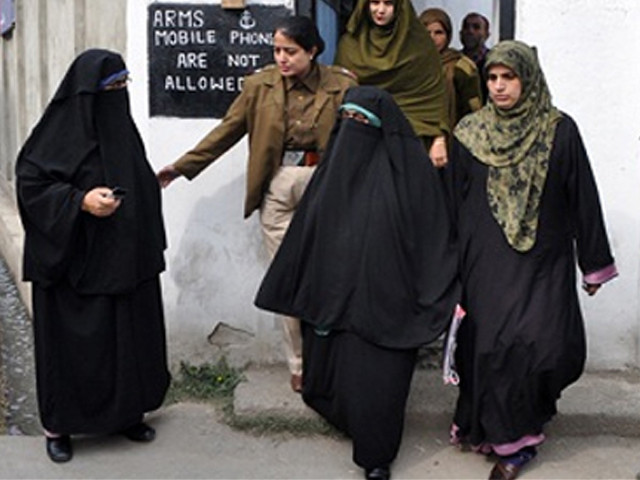As soon as the Indian authorities are done congratulating themselves over the arrest of the Kashmiri anti-nationalist figurehead, Asiya Andrabi, they can start explaining how they intend to win Kashmiri hearts and minds through an expanding list of despotic restrictions being imposed upon the people.
The firebrand chief of the all-female separatist group, Dukhtaran-e-Millat or “Daughters of Faith”, was recently arrested from her Soura resident over a bizarre list of charges. These include the crime of waving the Pakistani national flag and singing the Pakistani national anthem, as well as slaughtering a cow in stark protest of the newly-revisited law against banning of cow slaughter in Jammu and Kashmir. Earlier, she had also addressed a rally in Lahore through a telephone call, wishing Pakistan a happy Independence Day, and reaffirming her political devotion to the cause of Kashmir’s separation from India.
On the morning of Friday, she called for a fresh protest against the killing of three young youth whose bullet-ridden bodies were found in an apple orchard in Sopore district ; not a particularly rare sighting in Jammu and Kashmir. The incident here must be viewed in context of the use of systemic torture and arbitrary detentions in Kashmir, as reported by local as well as foreign sources.
That day, Andrabi was finally arrested. Reportedly, she had been under house-arrest long before that.
One may empathise with a state’s hesitance in allowing a separatist leader her unrestrained right to free expression. But what message does it air to the world, when a state harasses and arrests people over brandishing a piece of cloth, or harvesting beef?
Another factor that needs to be considered is the timing of the ban. World over, Muslims are preparing to celebrate Eidul Azha, an Islamic festival which entails the sacrifice of goats and cows. Why is it that the sentiments of certain communities are considered while others are side-lines? Considering the ban record in India so far, the motives, political or otherwise, are clearly evident.
It is unfortunate that Indian nationalists have taken to the social media to mock the Pakistani media’s ‘exaggerated’ interest in this story; without addressing the cologne-scented gift box of self-parodying news we’ve been generously offered to feed into our alleged ‘propaganda machine’. I am willing to give them the benefit of the doubt that behind the menagerie of flexed muscles and baleful tones, there is an internal discussion taking place on the system’s ever-tightening grip on the freedom of the Kashmiri people.
The mark of despotism, after all, is creating an interminable list of unfathomable rules, based almost solely on the cultural, religious, or politico-economic preferences of the ruling class; a list that may include anything from displaying the colours of an unfriendly state, to – I can only speculate – flipping your hair in the wrong direction.
Once these impossible regulations are put in place, the inevitable inability of the state to implement them all is attributed to the rulers’ leniency, and kind willingness to look the other way. But when a subject represents more than an ‘acceptable’ level of threat to the status quo, the same petty laws spring into force and are used to validate an arbitrary arrest.
A familiar malady seems to have overtaken Jammu and Kashmir. Here lies a Muslim-majority territory slapped with a ban on cow slaughter – a measure that has nothing to do with “border security” or any other trope used to routinely justify harsh restrictions on civilians. Hindu nationalists defending the law pointing out that it was reinvigorated by Kashmir’s own high court, neglecting a larger system in place that influences the court’s decisions. After all, how many Islam-inspired laws have been upheld by Justice Rana Bhagwandas’s gable in Islamabad?
The best thing India can do to ensure the continuity of a separatist struggle in the long-run, is pile increasingly stern measures on a civilian population that’s noticeably growling under the weight of the existing ones. Does this movement need another martyr?
Did you ban cow-slaughter in Kashmir right before Eid to offend Muslim sensibilities?
What message does it air to the world, when a state harasses and arrests people over harvesting beef?



COMMENTS
Comments are moderated and generally will be posted if they are on-topic and not abusive.
For more information, please see our Comments FAQ